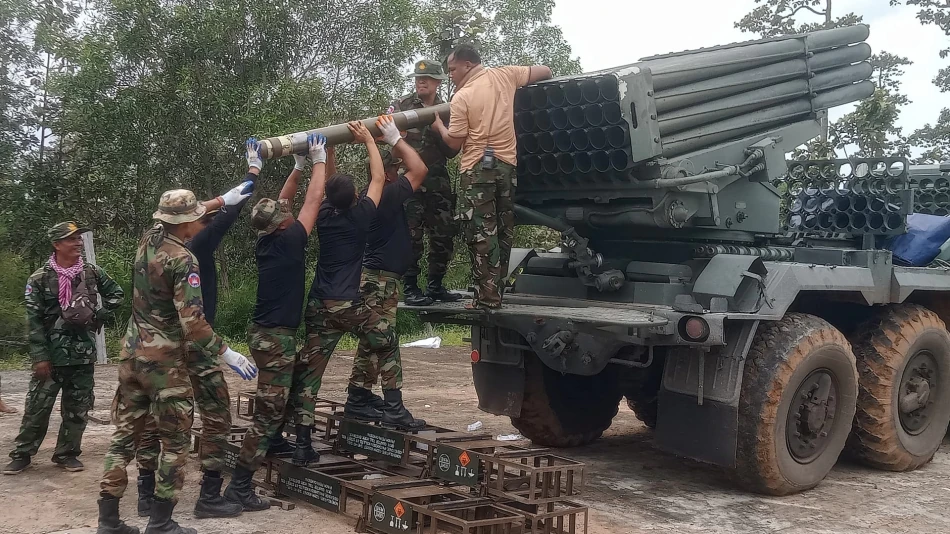
Thailand and Cambodia Clashes Escalate Despite Ceasefire Calls
Thailand-Cambodia Border Conflict Escalates as Third Day of Fighting Opens New Fronts
Southeast Asia's most serious military confrontation in over a decade continues to intensify as Thailand and Cambodia engage in their third consecutive day of armed conflict along disputed border territories. With at least 30 dead and over 130,000 displaced, the fighting has now expanded to new coastal areas, signaling a dangerous escalation that threatens regional stability and exposes deep-rooted territorial disputes that have simmered for years.
New Battle Fronts Emerge Along Disputed Coastline
The conflict took a concerning turn on Saturday when the Thai Navy reported fresh clashes in the coastal province of Trat, opening a new front more than 100 kilometers away from existing flashpoints. This geographic expansion suggests both nations are prepared to defend broader territorial claims rather than contain the dispute to specific border crossings.
The escalation follows a deadly incident in late May when a Cambodian soldier was killed during brief skirmishes. Since then, both countries have significantly reinforced their border positions, transforming what began as isolated incidents into sustained military confrontation.
Mounting Casualties and Civilian Impact
The human cost continues to rise, with Thailand reporting 19 military deaths while Cambodia's Defense Ministry spokesperson Mali Suchita confirmed 13 casualties—five soldiers and eight civilians. The displacement of over 130,000 people represents one of the largest population movements in the region since the 2004 tsunami, highlighting how quickly border disputes can spiral into humanitarian crises.
Landmine Allegations Heighten Tensions
Thailand's UN ambassador escalated diplomatic rhetoric by accusing Cambodia of planting fresh landmines on Thai territory, citing two incidents since mid-July that injured Thai soldiers. Cambodia has vehemently denied these allegations, but such accusations signal how both sides are preparing international justifications for their military actions.
Diplomatic Warfare Mirrors Military Confrontation
The conflict has shifted beyond border skirmishes into a full-scale diplomatic offensive. Cambodia's Defense Ministry accused Thailand of launching "deliberate, unjustified, and illegal military attacks" while mobilizing additional troops and equipment. This language suggests Cambodia is building a case for international intervention rather than bilateral resolution.
Cambodia has explicitly called on the international community to "condemn Thailand's aggression in the strongest terms," positioning itself as the victim of Thai expansionism. This strategy mirrors tactics used by smaller nations in territorial disputes with larger neighbors, seeking multilateral pressure to offset military disadvantages.
Thailand's Preference for Bilateral Solutions
Bangkok continues advocating for direct negotiations, telling the UN Security Council that Cambodia has "deliberately avoided meaningful dialogue" and instead seeks to "serve its own political agenda" through international forums. This reflects Thailand's confidence in its negotiating position and desire to avoid international scrutiny of its territorial claims.
Regional Implications and Historical Context
This confrontation represents the most serious Thai-Cambodian military engagement since the early 2000s, when similar border disputes led to periodic clashes. The timing coincides with Thailand's fragile coalition government facing internal pressure, suggesting domestic political considerations may be influencing military decisions.
The conflict also threatens ASEAN's principle of non-interference and peaceful dispute resolution, potentially forcing the regional bloc to choose between member states or risk appearing ineffective in managing regional security.
Economic and Strategic Stakes
Beyond immediate territorial control, both nations are likely protecting access to potential offshore resources in disputed coastal areas. The expansion to maritime boundaries in Trat province suggests economic interests may be driving military calculations, particularly given Southeast Asia's growing importance in global supply chains.
International investors and regional partners will be closely monitoring whether this conflict spreads or finds diplomatic resolution, as prolonged instability could disrupt trade routes and investment flows throughout the Mekong region.
Most Viewed News

 Sara Khaled
Sara Khaled






